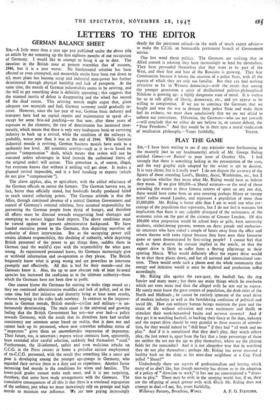PLAY THE GAME Stu,—I have been waiting to see if
any rejoinder were forthcoming to the masterly (not to say headmasterly) article of Mr. George Riding entitled Gaines—or Butter? in your issue of October 31st. I feel strongly that there is something lacking in the presentation of the case, and the very graphic style adopted by the writer is apt to deceive. It is very clever, but is it really true? I do not dispute the accuracy of the figures of those attending Lord's, Henley, Ascot, Wimbledon, etc., but I do question whether they mean what Mr. Riding would have us believe they mean. If we give 100,000—a liberal estimate—as the total of those attending the events at these famous centres of sport on any one day, these would have come from an area covering perhaps fifteen or twenty miles' radius round London, and represent a population of more than 15,000,000. Mr. Riding is better able than I am to work out what per- centage of the population that represents, but I do not feel it warrants his implication that there is any culpable disregard of the seriousness of the economic crisis on the part of the citizens of Greater London. Of this 100,000 what proportion would be school boys or girls, keen university students, cricket-loving parsons, women on dress parade and enthusias- tic amateurs who have risked a couple of hours away from the office and return thereto with extra vigour because they have seen their favourite game or sport demonstrated by first-string people? I cannot feel that such as these deserve the censure implied in the article, or that the export drive is likely to suffer from a fleeting pilgrimage to their sporting Mecca. What would definitely affect the export drive would be to shut these places down, and bar all national and international con- tests. There would settle such a gloom over the whole community that energy and initiative would at once be depleted and production suffer accordingly.
Mr. Riding tilts against the race-goer, the football fan, the dog fancier and many more ; but there are many things which he overlooks which are even more real than the alleged evils he sets out to expose. He surely must know the great centres of population, the drab cities of the North and Midlands ; he cannot be entirely ignorant of the cruel drive of modern industry as well as the bewildering confusion of political and social life. How can ordinary human beings maintain the pace and the strain of life without relaxation and even excitement and thrills to stimulate their work-benumbed brains and nervous systems? And if they get it in watching football, or backing their fancy at the dogs, industry and the export drive should be very grateful to these sources of stimula- tion, for they would indeed be " dull boys " if they had " all work and no play." And if it is complained that they don't play, they watch others play, the just retort is, apart from the fact that a large percentage of them are neither the sex nor the age to play themselves, where are the playing fields for the remainder? And it is not altogether true that in watching they do not play themselves ; perhaps Mr. Riding has never received a healthy hack on the shins as his next-door neighbour at a Cup Final yelled " Shoot!"
Undoubtedly there are aspects of professionalism and betting which many of us don't like, but though necessity has driven us to the adoption of a policy of "direction to work," it has not yet contemplated a "direc- tion to play." There may be evils in the sporting world, but, if so, they are the offspring of much greater evils with Which Mr. Riding does not attempt to deal.—I am, Sir, yours faithfully,
Willersey Rectory, Broadway, Worcs. A. F. G. FLETCHER.




























 Previous page
Previous page